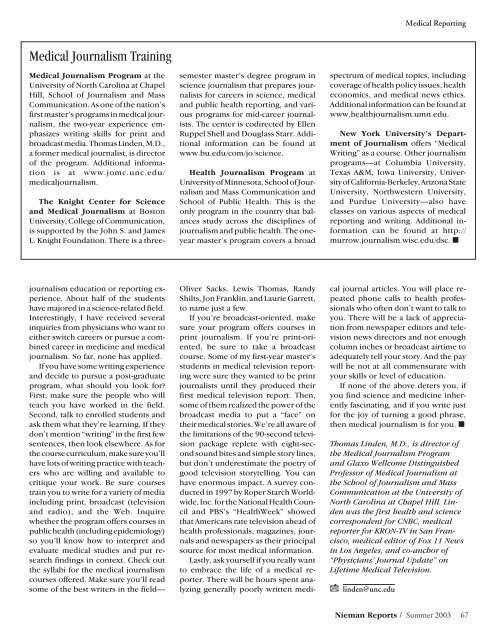summer-2003-Part 2-live - Nieman Foundation - Harvard University
summer-2003-Part 2-live - Nieman Foundation - Harvard University
summer-2003-Part 2-live - Nieman Foundation - Harvard University
- No tags were found...
Create successful ePaper yourself
Turn your PDF publications into a flip-book with our unique Google optimized e-Paper software.
Medical ReportingMedical Journalism TrainingMedical Journalism Program at the<strong>University</strong> of North Carolina at ChapelHill, School of Journalism and MassCommunication. As one of the nation’sfirst master’s programs in medical journalism,the two-year experience emphasizeswriting skills for print andbroadcast media. Thomas Linden, M.D.,a former medical journalist, is directorof the program. Additional informationis at www.jomc.unc.edu/medicaljournalism.The Knight Center for Scienceand Medical Journalism at Boston<strong>University</strong>, College of Communication,is supported by the John S. and JamesL. Knight <strong>Foundation</strong>. There is a threesemestermaster’s degree program inscience journalism that prepares journalistsfor careers in science, medicaland public health reporting, and variousprograms for mid-career journalists.The center is codirected by EllenRuppel Shell and Douglass Starr. Additionalinformation can be found atwww.bu.edu/com/jo/science.Health Journalism Program at<strong>University</strong> of Minnesota, School of Journalismand Mass Communication andSchool of Public Health. This is theonly program in the country that balancesstudy across the disciplines ofjournalism and public health. The oneyearmaster’s program covers a broadspectrum of medical topics, includingcoverage of health policy issues, healtheconomics, and medical news ethics.Additional information can be found atwww.healthjournalism.umn.edu.New York <strong>University</strong>’s Departmentof Journalism offers “MedicalWriting” as a course. Other journalismprograms—at Columbia <strong>University</strong>,Texas A&M, Iowa <strong>University</strong>, <strong>University</strong>of California-Berkeley, Arizona State<strong>University</strong>, Northwestern <strong>University</strong>,and Purdue <strong>University</strong>—also haveclasses on various aspects of medicalreporting and writing. Additional informationcan be found at http://murrow.journalism.wisc.edu/dsc. ■journalism education or reporting experience.About half of the studentshave majored in a science-related field.Interestingly, I have received severalinquiries from physicians who want toeither switch careers or pursue a combinedcareer in medicine and medicaljournalism. So far, none has applied.If you have some writing experienceand decide to pursue a post-graduateprogram, what should you look for?First, make sure the people who willteach you have worked in the field.Second, talk to enrolled students andask them what they’re learning. If theydon’t mention “writing” in the first fewsentences, then look elsewhere. As forthe course curriculum, make sure you’llhave lots of writing practice with teacherswho are willing and available tocritique your work. Be sure coursestrain you to write for a variety of mediaincluding print, broadcast (televisionand radio), and the Web. Inquirewhether the program offers courses inpublic health (including epidemiology)so you’ll know how to interpret andevaluate medical studies and put researchfindings in context. Check outthe syllabi for the medical journalismcourses offered. Make sure you’ll readsome of the best writers in the field—O<strong>live</strong>r Sacks, Lewis Thomas, RandyShilts, Jon Franklin, and Laurie Garrett,to name just a few.If you’re broadcast-oriented, makesure your program offers courses inprint journalism. If you’re print-oriented,be sure to take a broadcastcourse. Some of my first-year master’sstudents in medical television reportingwere sure they wanted to be printjournalists until they produced theirfirst medical television report. Then,some of them realized the power of thebroadcast media to put a “face” ontheir medical stories. We’re all aware ofthe limitations of the 90-second televisionpackage replete with eight-secondsound bites and simple story lines,but don’t underestimate the poetry ofgood television storytelling. You canhave enormous impact. A survey conductedin 1997 by Roper Starch Worldwide,Inc. for the National Health Counciland PBS’s “HealthWeek” showedthat Americans rate television ahead ofhealth professionals, magazines, journalsand newspapers as their principalsource for most medical information.Lastly, ask yourself if you really wantto embrace the life of a medical reporter.There will be hours spent analyzinggenerally poorly written medicaljournal articles. You will place repeatedphone calls to health professionalswho often don’t want to talk toyou. There will be a lack of appreciationfrom newspaper editors and televisionnews directors and not enoughcolumn inches or broadcast airtime toadequately tell your story. And the paywill be not at all commensurate withyour skills or level of education.If none of the above deters you, ifyou find science and medicine inherentlyfascinating, and if you write justfor the joy of turning a good phrase,then medical journalism is for you. ■Thomas Linden, M.D., is director ofthe Medical Journalism Programand Glaxo Wellcome DistinguishedProfessor of Medical Journalism atthe School of Journalism and MassCommunication at the <strong>University</strong> ofNorth Carolina at Chapel Hill. Lindenwas the first health and sciencecorrespondent for CNBC, medicalreporter for KRON-TV in San Francisco,medical editor of Fox 11 Newsin Los Angeles, and co-anchor of“Physicians’ Journal Update” onLifetime Medical Television.linden@unc.edu<strong>Nieman</strong> Reports / Summer <strong>2003</strong> 67
















